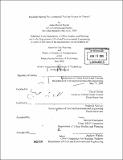| dc.contributor.advisor | David Geltner and Frederick Salvucci. | en_US |
| dc.contributor.author | Misiak, Jodie Mercer | en_US |
| dc.contributor.other | Massachusetts Institute of Technology. Dept. of Civil and Environmental Engineering. | en_US |
| dc.coverage.spatial | n-us-il | en_US |
| dc.date.accessioned | 2006-06-19T17:35:43Z | |
| dc.date.available | 2006-06-19T17:35:43Z | |
| dc.date.copyright | 2005 | en_US |
| dc.date.issued | 2005 | en_US |
| dc.identifier.uri | http://hdl.handle.net/1721.1/33048 | |
| dc.description | Thesis (M.C.P.)--Massachusetts Institute of Technology, Dept. of Urban Studies and Planning; and, (S.M.)--Massachusetts Institute of Technology, Dept. of Civil and Environmental Engineering, 2005. | en_US |
| dc.description | Includes bibliographical references (leaves 149-154). | en_US |
| dc.description.abstract | From a regional mobility perspective, Chicagoland is in serious trouble. The current Chicago Transit Authority (CTA) funding shortfall is just the most recent evidence of major flaws in the region's transit governance and finance structures. Over the past two decades, there have been numerous reasons and opportunities to modify the regional approach to public transportation provision. Yet the Regional Transportation Authority (RTA), the area's transit oversight entity, never initiated a critical re-evaluation of its role. Ideally, the central goal of the RTA would be to enable ample transport options throughout the region. However, rather than fostering enhanced service and increased ridership levels, the RTA funding process has resulted in performance declines and has encouraged a divisive political environment. This is ultimately damaging to both the economic health and the global competitiveness of the region. Now, as Chicagoland faces a particularly severe budget crisis, it is time to finally begin the discussion that should have commenced two decades ago. The region must alter its approach to transit finance and an additional operations funding source must be identified immediately. The implementation of a region-wide, non-residential parking fee could help achieve both of these goals. When compared with the option of a sales tax increase, the advantages of a parking fee include: - It would encourage a greater sense of regionalism - It would have a rational nexus to auto mode externalities - The statutory incidence would not be on the general public and the magnitude would be minimal - It would serve as the impetus for a more merit-based approach to regional transit finance | en_US |
| dc.description.statementofresponsibility | by Jodie Mercer Misiak. | en_US |
| dc.format.extent | 156 leaves | en_US |
| dc.format.extent | 13542533 bytes | |
| dc.format.extent | 13551261 bytes | |
| dc.format.mimetype | application/pdf | |
| dc.format.mimetype | application/pdf | |
| dc.language.iso | eng | en_US |
| dc.publisher | Massachusetts Institute of Technology | en_US |
| dc.rights | M.I.T. theses are protected by copyright. They may be viewed from this source for any purpose, but reproduction or distribution in any format is prohibited without written permission. See provided URL for inquiries about permission. | en_US |
| dc.rights.uri | http://dspace.mit.edu/handle/1721.1/7582 | |
| dc.subject | Urban Studies and Planning. | en_US |
| dc.subject | Civil and Environmental Engineering. | en_US |
| dc.title | Regional parking fee : a potential funding source for transit? | en_US |
| dc.type | Thesis | en_US |
| dc.description.degree | S.M. | en_US |
| dc.description.degree | M.C.P. | en_US |
| dc.contributor.department | Massachusetts Institute of Technology. Department of Civil and Environmental Engineering | |
| dc.contributor.department | Massachusetts Institute of Technology. Department of Urban Studies and Planning | |
| dc.identifier.oclc | 62120379 | en_US |
